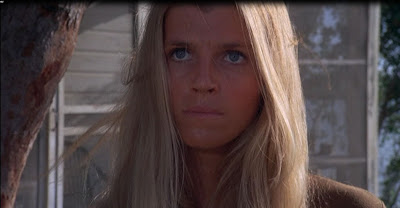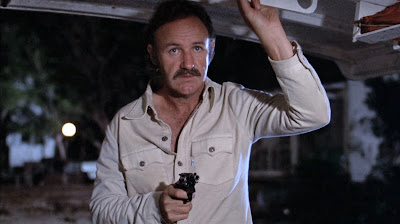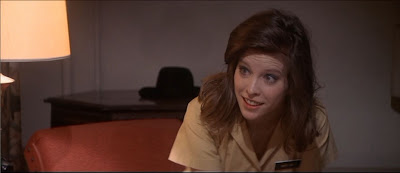If the amoral bed-hoppers that make up the bulk of daytime tabloid talk shows were articulate, intelligent, impossibly attractive, and rich; their lives might be something like the lives of the four spiritually damaged protagonists of Closer, Mike Nichols' searing look at the pain people cause one another in the name of love.
The tony trappings of upscale London
Changing Partners
Having explored the ins and outs of caustic relationships in both Who's Afraid of Virginia Woolf? (1966) and Carnal Knowledge (1971), Mike Nichols is cinema's unofficial frontline correspondent in the war between the sexes. With wit and candor, he goes to places of rare honesty in human relations and somehow finds ways of making us see parts of ourselves in some of the most odious characters. He has a gift for shining a compassionate but cold light on some of the worst aspects of human interaction and, in the process, reinforces the notion that sometimes, even at our most monstrous, most of us are rarely ever less than just human.
"Hello, Stranger"
WHAT I LOVE ABOUT THIS FILM:
Portman: “I don’t eat fish.”
Law: “Why not?”
Portman: “Fish piss in the sea.”
Law: “So do children.”
Portman: “I don’t eat children, either."
- but direct and to the point in revealing character and the small ways we use words to protect ourselves, wound others, and ultimately conceal. The film is as much a treat for the ears as it is for the eyes.
The Truth:
“Lying is the most fun a girl can have without taking her clothes off. But it’s better if you do.”
PERFORMANCES
The Lie
THE STUFF OF FANTASY
"A bunch of sad strangers photographed beautifully.” She might just as well have been talking about the film she's appearing in.
Closer, with its gleaming sets and uniformly gorgeous cast, uses old-time glamour to present a merciless look at the dark side of romantic desire. It's so effective in creating a kind of visual/emotional paradox that I can't help thinking it's a conscious creative choice on Nichols' part.
WHAT FUELED MY DREAMS
To my way of thinking, a film like Closer gives love the respect it deserves.
Not everybody has the stomach for movies like this. Indeed, the public stayed well away from this film when it was released. But the relationships I grew up around (and I dare say a good many of the relationships I see today) look more like the ones depicted here than the inherently dishonest, wish-fulfillment fantasies of The Bridges of Madison County or Under the Tuscan Sun. That may be my curse or blessing; I don't know. But what I do know is that I've seen more tears shed and people hurt over the pursuit of false ideals than I ever have over people coming to terms with the fact that love takes courage, selflessness, and a willingness to be vulnerable.
Closer is indeed a film about unpleasant people acting unpleasantly, but everyone is shot so lovingly they're practically incandescent. As a fan of vintage movies, my heart has a special place for that time in history (pre-late-50s realism) when movies were populated exclusively by those humanoid gods and goddesses we called movie stars. They didn't look like anyone we'd ever seen, and the world they inhabited onscreen didn't even remotely look like the one we inhabited. It was a hyper-reality that created a dreamscape to build fantasies on.
THE STUFF OF DREAMS
The one scene I never tire of watching is a sequence that takes place in a private room of a strip club where Natalie Portman and Clive Owen verbally spar about love, lust, and longing.
It is amazing on so many levels. From a purely technical standpoint, the astounding virtuosity of the camera angles alone makes for a unitary lesson in filmmaking.
It's funny, tense, sexy as hell, and oddly moving as these two enact a mating dance of the lonely.
It certainly doesn't hurt that Natalie Portman sets the screen aflame, either.
WOW!
WHAT FUELED MY DREAMS
From everything I've written thus far, I've made it sound as though Closer were an anti-romantic comedy (black comedy) and basically down on love. The truth is, like that other favorite of mine, Two for the Road, Closer is at its core a deeply romantic film. Chiefly because it dares to show the bare bones of relationships and dramatizes the hard work and self-sacrifice necessary to achieve true intimacy with another. The four protagonists in Closer all fumble about blindly seeking love without knowing how to return it, demanding love without earning it, and giving love without committing to it.
Love Gets Ugly
It deflates the popular romantic ideal (one favored by movie love stories) of the instant attraction, the animal connection that sparks all great romances. Closer dares to posit that those who indulge this conceit are fantasists in love with the idea of love and are unprepared (or lack the maturity) to do the hard work required if one hopes to grow "closer" to another individual. To my way of thinking, a film like Closer gives love the respect it deserves.
Not everybody has the stomach for movies like this. Indeed, the public stayed well away from this film when it was released. But the relationships I grew up around (and I dare say a good many of the relationships I see today) look more like the ones depicted here than the inherently dishonest, wish-fulfillment fantasies of The Bridges of Madison County or Under the Tuscan Sun. That may be my curse or blessing; I don't know. But what I do know is that I've seen more tears shed and people hurt over the pursuit of false ideals than I ever have over people coming to terms with the fact that love takes courage, selflessness, and a willingness to be vulnerable.
Law: “Deception is brutal. I’m not pretending otherwise”
Closer is an adult story about the responsibilities of real love. That it tells its story with wit, intelligence, and style only serves to make it one of my fave-rave films of all time. A modern realist classic.

.JPG)
.JPG)
.JPG)
.JPG)
.JPG)
.JPG)
.JPG)
.JPG)
.JPG)
.JPG)
.JPG)
.JPG)
.JPG)
.JPG)
.JPG)
.JPG)
.JPG)
.JPG)
.JPG)
.JPG)

.JPG)





































